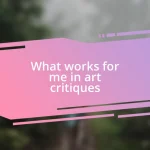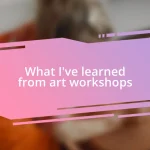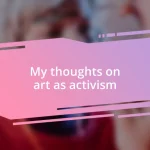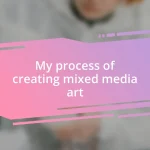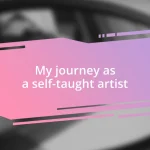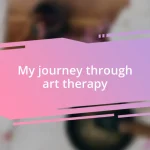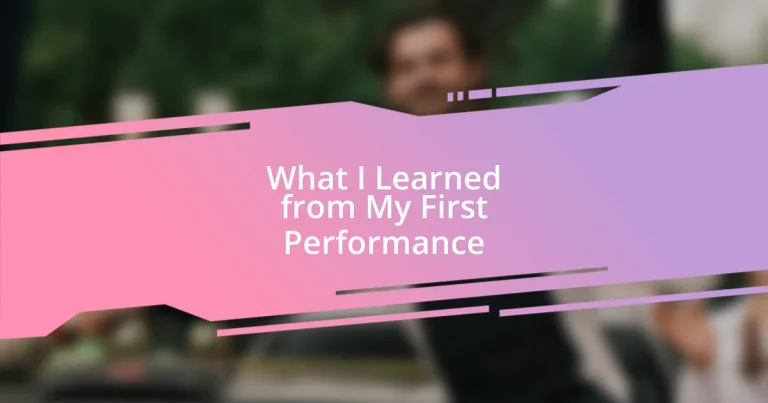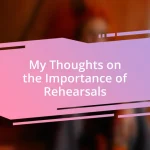Key takeaways:
- Overcoming initial performance anxiety involves breathing techniques, visualization, and positive self-affirmations to build confidence.
- Engaging with the audience enhances the performance experience, as their reactions create a shared connection that motivates the performer.
- Continuous growth as a performer comes from embracing vulnerability, reflecting on experiences, and adapting to unexpected moments during performances.
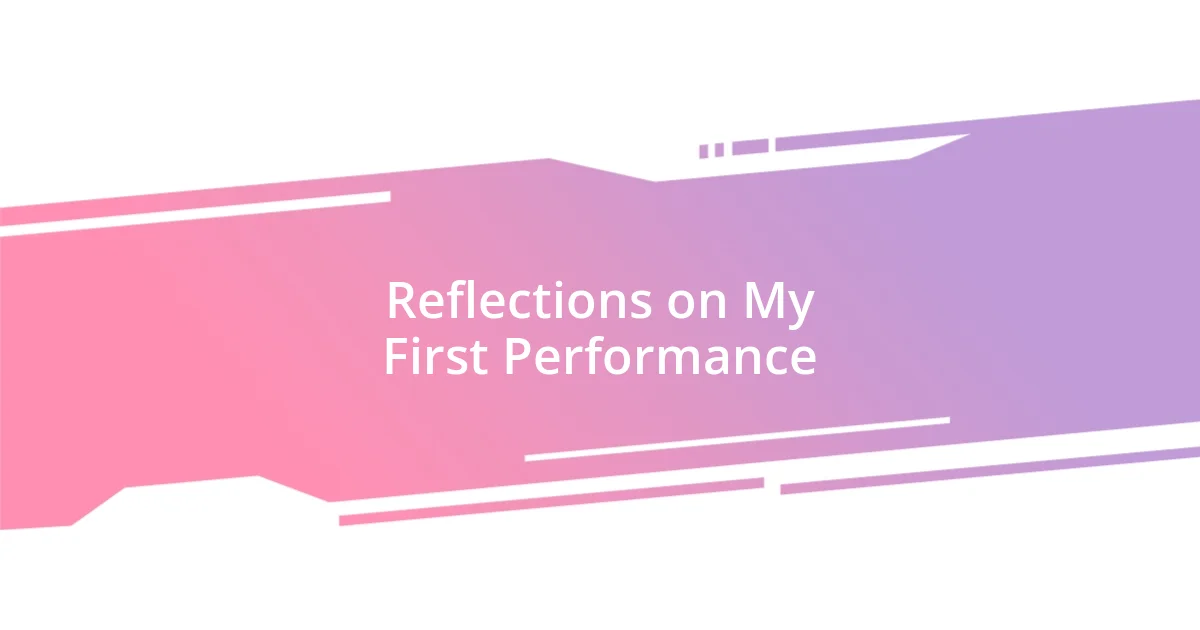
Reflections on My First Performance
Reflecting on my first performance, I can’t help but recall the palpable mix of excitement and nerves that coursed through me on that day. Stepping onto the stage felt like jumping off a cliff, and I remember thinking, “What if I forget my lines?” Yet, once the spotlight hit me, all those worries seemed to fade into the background.
I vividly remember a moment mid-performance when I noticed my family in the audience; their encouraging smiles made the whole experience feel a bit like home. Isn’t it fascinating how a simple glance can ground you when you’re surrounded by the frenzy of lights and sounds? I could feel my heartbeat sync with the rhythm of my lines, and in that moment, I truly understood the power of connection—both with the audience and with my craft.
The aftermath was a whirlwind of both relief and exhilaration. While I was proud of overcoming my fears, I also realized how much I had to learn. What struck me the most was the realization that every performance is a stepping stone, each one teaching me something new. Isn’t it intriguing how vulnerability can turn into strength, urging us to grow? It’s those lessons that I carry with me, shaping my journey as a performer.
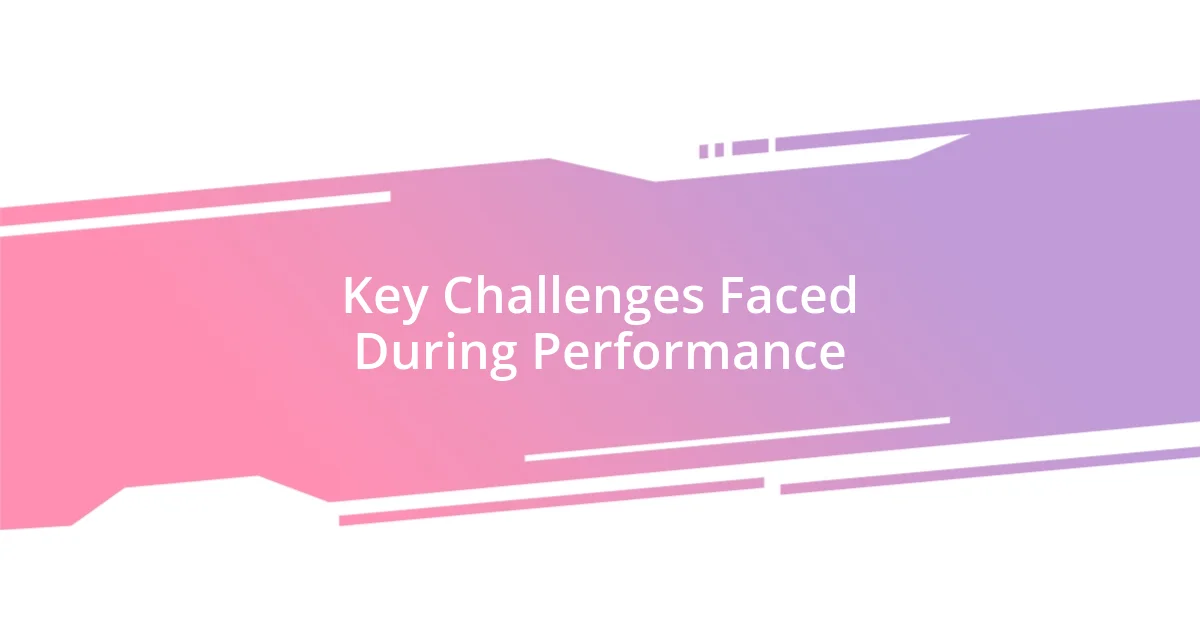
Key Challenges Faced During Performance
As I stepped onto the stage, one of the key challenges I faced was the overwhelming anxiety that came with performing. The butterflies in my stomach felt like they were doing somersaults, making it hard to focus on my lines. It was in that moment that I had to remind myself to breathe and to trust the preparation I had done. That little pep talk with myself became essential when navigating the sea of emotions.
Another big hurdle was the unexpected technical difficulties. Midway through my monologue, the lights flickered, and I almost lost my train of thought. I can recall the panic creeping in but decided to channel it into my performance instead. I adeptly worked through the moment, and it felt empowering to adapt quickly and keep the audience engaged despite the setback. It taught me that flexibility is crucial in live performance.
Lastly, the pressure of stage presence loomed heavily over me. It was not just about delivering my lines; it was about connecting with the audience. I remember stealing a glance at an unfamiliar face, which sent a rush of doubt through me. I learned that maintaining eye contact and engaging every corner of the audience could transform that anxiety into energizing connection. Embracing this challenge deepened my commitment to mastering the art of performance.
| Challenge | Personal Experience |
|---|---|
| Anxiety | Breathe and trust your preparation. |
| Technical difficulties | Adapt quickly; it’s empowering. |
| Stage presence | Engage the entire audience. |
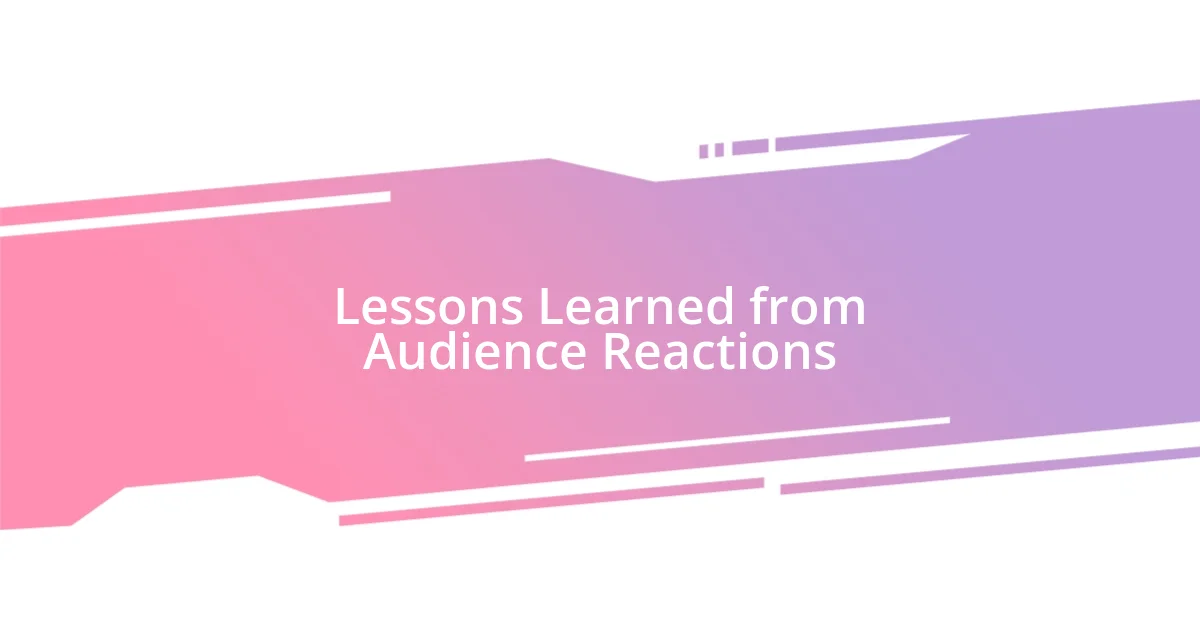
Lessons Learned from Audience Reactions
Experiencing audience reactions during my first performance was a real eye-opener. I still remember the moment I delivered a punchline and heard a genuine laugh ripple through the crowd. That sound? It was electric. It made me realize how alive the connection between performer and audience can be. Sometimes, reactions go beyond applause; they are a shared experience. I learned that tuning into those responses can elevate your performance in ways you never imagined.
- A shared laugh creates a bond, encouraging me to take risks.
- Positive feedback empowers me to dig deeper into my character.
- Silence can be equally powerful; it often means the audience is fully engaged, hanging on every word.
In addition, the diverse reactions showed me how crucial it is to adapt. Midway through my act, I noticed a group in the back acting a bit distracted. Adjusting my energy helped pull them back into the performance. It’s a dance of sorts—responding to the vibes in the room. This taught me that awareness of the audience isn’t just beneficial, it’s essential for any performer.
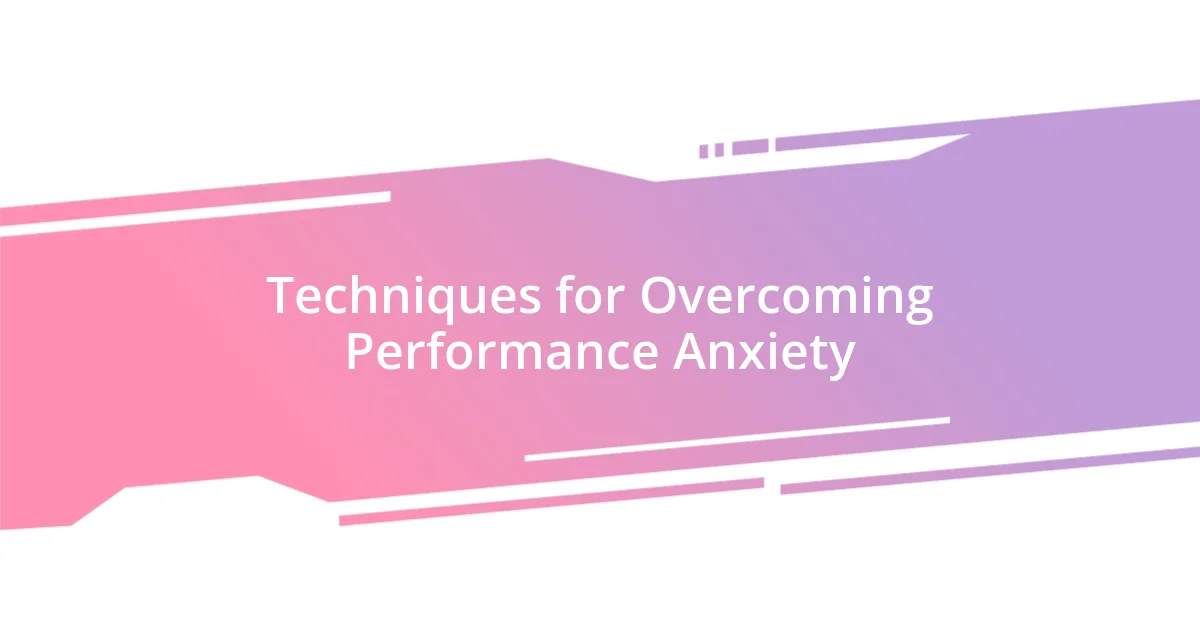
Techniques for Overcoming Performance Anxiety
When I first felt that knot of anxiety, I discovered the power of visualization. I took a moment backstage, closed my eyes, and imagined myself delivering my lines flawlessly, with the audience responding positively. It’s incredible how picturing a successful performance can transform your mindset. Have you ever tried this? I found that it grounded me, making the stage feel less daunting and more like a welcoming space.
Another technique that worked wonders for me was grounding exercises. Just before stepping out, I would find a quiet corner and focus on my breath. Inhale, hold it for a moment, then release slowly. This simple act shifted my focus from anxiety to the present moment. I often remind myself that it’s normal to feel nervous, but remembering to breathe—really breathe—can change everything. It’s surprising how such a small thing can have such a profound impact on my nerves.
In the thick of my performance, I employed positive affirmations to stave off self-doubt. I whispered phrases to myself like, “I am prepared, I am capable.” Each time I felt my confidence wavering, these affirmations cut through the noise. What about you? Can you recall a time when a little self-encouragement helped you push through? I found it vital to speak kindly to myself amidst the chaos, reminding me that everyone in that audience was rooting for my success.
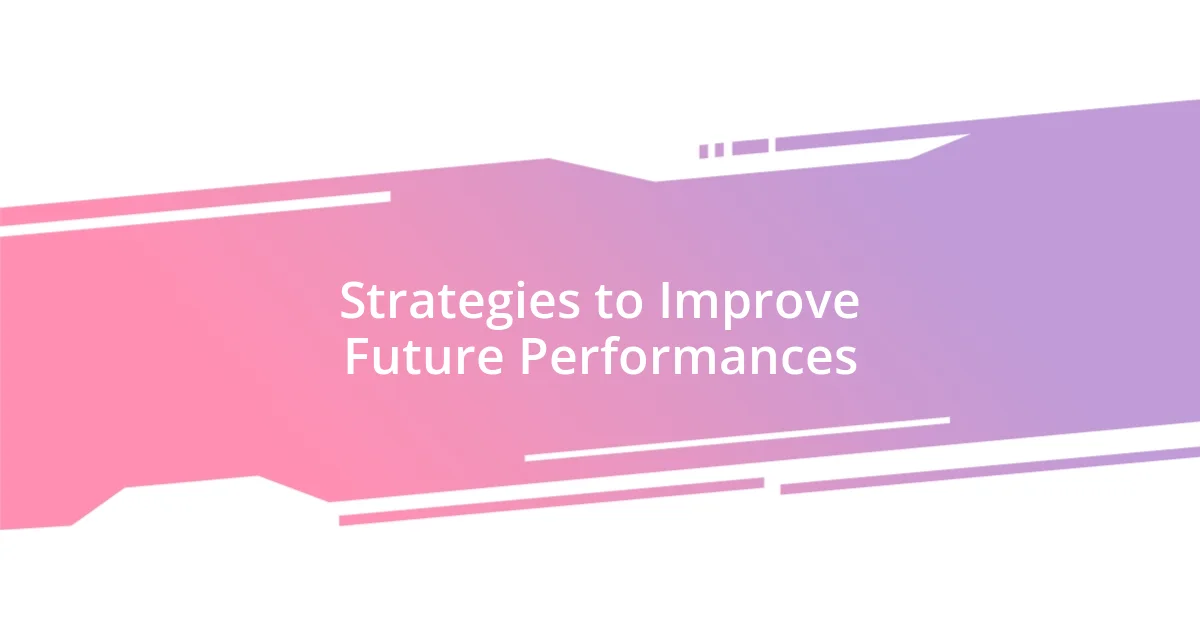
Strategies to Improve Future Performances
One strategy that really stood out for me was the importance of rehearsal and preparation. Before my next performance, I made it a point to practice in front of friends. Their feedback was incredibly valuable. It was like having a mini audience that could point out both my strengths and areas for improvement. I realized that the more familiar I became with my material, the less I relied on the script and the more I could engage authentically with the audience. Have you ever practiced in front of someone? That little bit of vulnerability can create a shift in confidence.
I also learned to incorporate reflection after each performance. Taking a moment to think about what worked and what didn’t helped me identify specific moments that resonated with the audience. Did they respond to my humor? Was there a part where I felt a disconnect? Jotting these thoughts down immediately after leaving the stage allowed me to track my progress over time. I remember one night when I felt I hadn’t nailed a particular section, but in my notes, I discovered that others found it charming. Can you see how this kind of self-reflection helps strip away those harsher, misleading judgments?
Lastly, embracing vulnerability became a game-changer for me. Instead of trying to maintain a perfect façade, I made a conscious effort to show my true self. I remember a point during my last show when I accidentally tripped on stage, and instead of panicking, I laughed it off and engaged with the audience about it. They immediately related to me more. It’s fascinating how sharing those imperfect moments can create a connection that feels genuine and can even enhance the overall experience. What if more performers took this approach? I think we’d see deeper relationships between artists and their audiences.
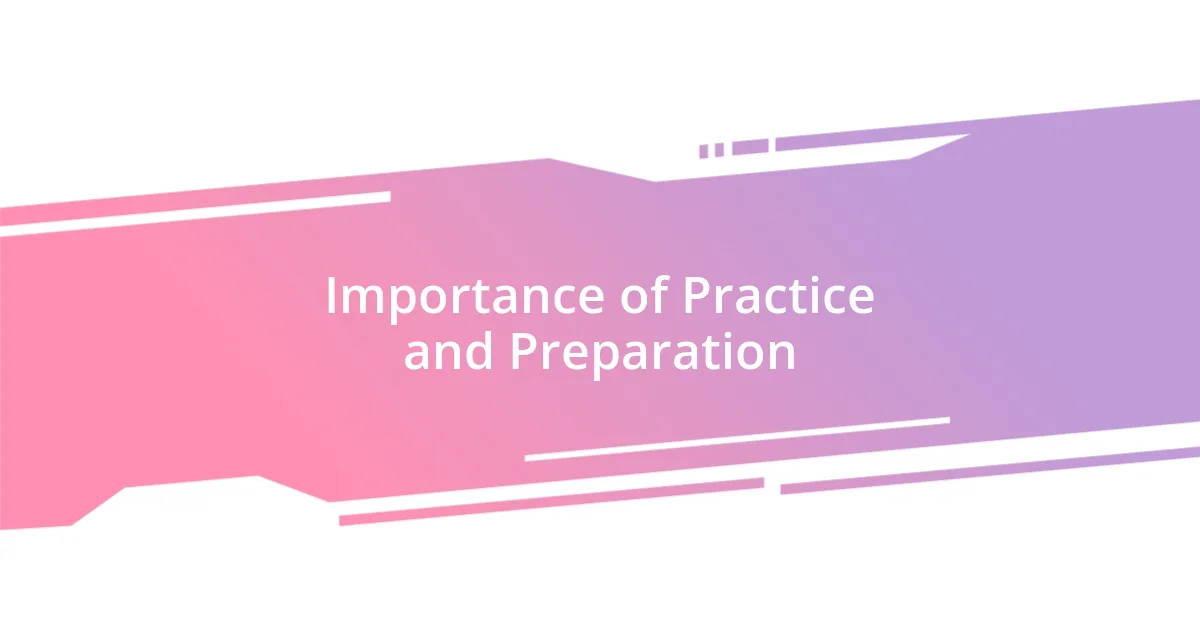
Importance of Practice and Preparation
The value of practice and preparation cannot be overstated. I distinctly remember the hours I spent rehearsing my lines alone in my room, pacing back and forth, trying to perfect my delivery. Have you ever felt the liberation that comes from nailing a scene just because you practiced it repeatedly? The more I rehearsed, the more confident I became. It’s empowering to know that my hard work will pay off when it matters most.
Once, I participated in an open mic night that felt daunting until I realized how much preparation would enhance my performance. As I rehearsed in front of a mirror, I noticed little nuances in my expressions and movements that I could improve. Isn’t it amazing how self-observation can lead to growth? This experience taught me that preparation is more than just memorizing lines; it involves connecting with the material and understanding the rhythm of my delivery.
Reflecting on my preparation process, I can see the difference it made in my performances. Before going on stage, I would run through my entire piece in my mind, visualizing each segment. It felt like I was laying the foundation for a strong performance. Have you ever taken that moment to mentally rehearse before a big moment? It’s during those quiet, focused moments that I truly felt ready—not just to perform but to truly connect with the audience. Each practice session and mental rehearsal transformed my anxiety into excitement, paving the way for a memorable experience.
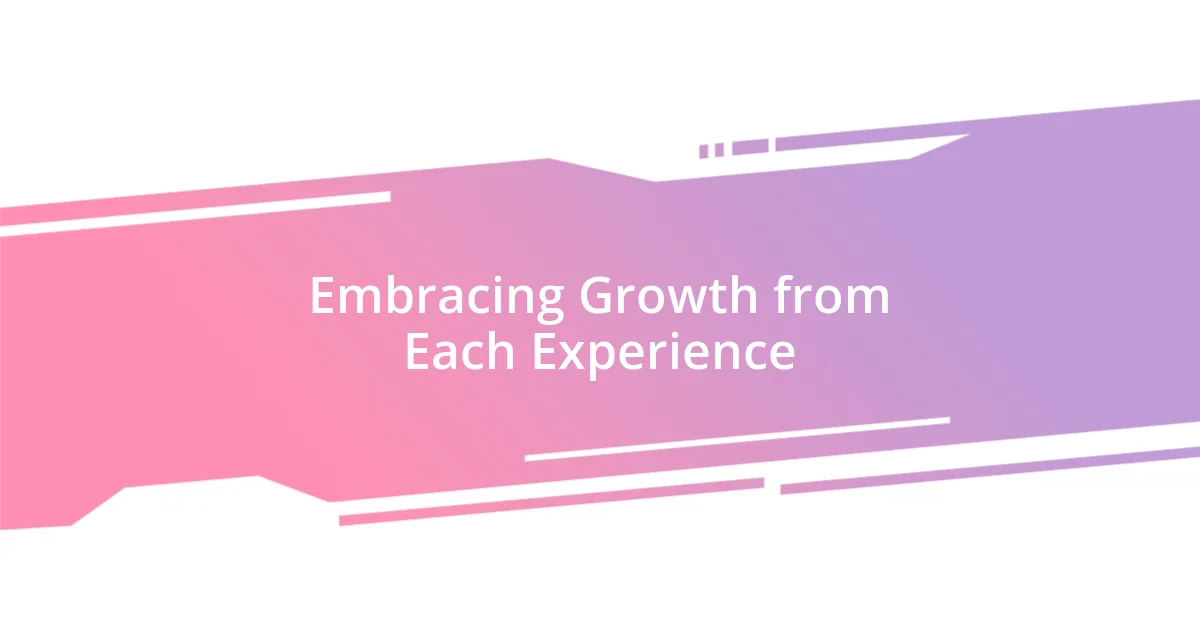
Embracing Growth from Each Experience
Embracing growth is a journey that often unfolds with each performance. I remember a time when I finished a show feeling underwhelmed, thinking I didn’t meet my own expectations. However, after talking with audience members, I realized they enjoyed the authenticity of my delivery, even if it hadn’t matched up to my overly critical self-assessment. Isn’t it interesting how the perception of others can often reveal our blind spots? This experience taught me that growth isn’t always linear; sometimes, it’s about reshaping our understanding of success.
There was a pivotal moment during one performance when I deviated from my script due to an unexpected interruption. Initially, I was thrown off balance, but I chose to go with the flow, turning the moment into a light-hearted joke. The laughter that followed filled the room with warmth, and I thought about how this spontaneous choice helped me grow as a performer. Have you ever found that your best moments come from embracing the unexpected? It’s in these unplanned instances that we often discover our true potential.
Reflecting on each experience has been crucial to my growth. I vividly recall journaling after a particularly challenging show, my fingers racing across the page as I unpacked each segment of my performance. What worked? What didn’t? This process wasn’t just about critiquing myself but also celebrating the small victories. I realized that focusing on the positives encourages a mindset of continuous improvement. How often do we take the time to recognize our progress instead of fixating only on our shortcomings? For me, this shift towards a more balanced perspective has been a revelation in embracing growth.

